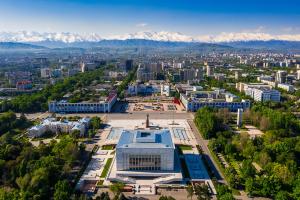Four years ago, when the COVID-19 pandemic hit, it disrupted the normal functioning of open markets. The ensuing crisis had crippling effects on global trade and productive capacities: it broke supply chains, reduced connectivity and slowed the flow of essential goods. Global food and energy insecurity increased, hindering the fight against poverty, hunger and inequality, ultimately undermining efforts to achieve the 2030 Agenda for Sustainable Development. Effects were specifically hard felt in developing countries, including countries with economies in transition in Central Asia and the Eurasian region.
Since that time, the world economy has bounced back, supported by public investments, higher social spending and productivity gains linked to innovation and the use of new digital tools. But the recovery was uneven across and within countries. New shocks and global tensions also occurred, which heightened the risks of reversing the initial gains. New challenges included higher food and fuel prices; more stringent credit conditions; and a rise in protectionist policies by large economies, which contributed to increased uncertainties about the resilience of national economies in the post- COVID era. Significantly, the World Bank’s five-year global growth forecast for Europe and Central Asia for the period 2020–24 is at its weakest in three decades, due to a weak recovery in China and a sharp slowdown in the euro area.
A UNECE regional workshop recently held in Bishkek, Kyrgyzstan, focused on the impact of the COVID-19 crisis on regional value chains and the prospects for future trade and economic integration in the region. Government officials, export and investment promotion agencies, private sector and academia took stock of the implications that the pandemic has had on production and trade in the region, and discussed possible policy responses.
The event addressed a number of issues, including the urgency to build more resilient supply chains in the context of reshoring; the strategic priority to diversify economies away from natural resource extraction, and the importance of the agricultural sector as strategic policy area to address food security concerns. Deputy Minister of Economy and Commerce of Kyrgyzstan, Sanzhar Bolotov, highlighted the importance of enhancing the country\s export potential in agriculture. He emphasized that in Kyrgyzstan, 66 per cent of population lives rural areas and 62 per cent of enterprises operate in the agricultural sector.
Discussions highlighted the potential to leverage UNECE tools and recommendations to build-back-better, specifically by removing cross-border and behind-the-border non-tariff barriers to trade. Among others, participants looked at several business process analyses that identify bottlenecks in trade facilitation and the quality infrastructure for trade (e.g. conformity assessment, risk management). Discussions also focused on specific agricultural products that are exported to destination markets in Europe and Asia: dried prunes and apricots (Kyrgyzstan), vegetable oil (Kazakhstan) and fish products (Armenia).
In a context of growing relevance of non-tariff trade measures, UNECE tools, including normative tools and capacity-building instruments can go a long way to improve market access and smooth the impact of restrictive trade measures affecting supply chains, such as border closures, disruptions to production and transportation. For example, streamlined customs procedures and more efficient cross-border trade through the increased use of digital solutions based on UN/CEFACT recommendations can help reduce the complexity of transactions, ensuring better preparedness for future crises and supporting digital and green transformations. Similarly, the use of UNECE guidance on agricultural quality standards (UNECE hosts over 100 agricultural quality standards for fresh fruit and vegetables, dry and dried produce, meat, seed potatoes, cut flowers, eggs and egg products) and the use of UNECE tools bolstering the quality infrastructure institutions for certification and conformity assessment can go a long way to enhance export capacities in countries with economies in transition.
The workshop also helped to shape forthcoming policy briefs for each of these countries, which will be launched at the ninth session of the UNECE’s Trade Committee, the Steering Committee on Trade Capacity and Standards, scheduled for 26-28 June 2024 in Geneva, Switzerland.
